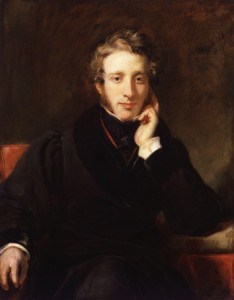General Information
Sir Edward Bulwer-Lytton (1803-1873) was born on Baker st. in London, England on the 25th of May to mother Elizabeth Barbara Lytton, and father General William Earle Bulwer. General Bulwer died in 1807 when his son was four years old. Edward Bulwer-Lytton was raised by his mother and sent to several schools for education, Dr. Rudduck’s School in Fulham in 1812, and then Dr. Rottingdean’s School following poor treatment at his previous school. Bulwer-Lytton was not initially successful in school and his mother feared for his ability to attend university. He also suffered
from acute ear infections and pain throughout his life; it is believed to be a factor in his cause of death as he complained of severe ear pain and headache before he died (Grosvenor, 1988).
Bulwer-Lytton was an accomplished poet, novelist and participated in some political roles, first as a democrat and then as a conservative in 1852. In 1822 Bulwer-Lytton entered Trinity College as a student of English and received the Chancellor’s Gold Medal for English Verse three years later. The following year he received his B.A. and began printing a small circulation of poems entitled “Weeds and Wild Flowers”. His mother had a very influential role in his career, pressuring him to get his works published, the first being “Ismael: An Oriental Tale, with Other Poems” published by a firm in London, J. Hatchard and Son. In 1866 he was granted the title of Baron.
In 1827, Bulwer-Lytton entered into a tumultuous marriage to Rosina Doyle Wheeler, much against his mother’s will. They had two children, a daughter Lady Emily Elizabeth Bulwer-Lytton, and a son Edward “Robert” Bulwer-Lytton. In 1833 Bulwer-Lytton and Wheeler separated on unfriendly terms due to Bulwer-Lytton’s busy career as a politician and novelist as well as numerous infidelities on his part. The separation became legal three years later and in 1839 Wheeler published “Cheveley or The Man of Honor” as an act of vengeance on Bulwer-Lytton. The writing severely criticized his character and mocked his hypocrisy. In response, Bulwer-Lytton denied her access to the children, withheld her allowance and even had her committed to a mental asylum, which she was released from after the public protested (Allingham, 2000).
Political Career
Bulwer-Lytton began his political career as a supporter of democracy and held office in Saint Ives in Cornwall for a brief time before working for American President Lincoln in 1832. Bulwer-Lytton supported the first Reform bill and had a major role in the repeal of newspaper stamp duties. Bulwer-Lytton feared politics were getting in the way of his first love of writing and removed himself from them by leaving Parliament in 1841. Bulwer-Lytton returned to politics in 1852 as a member of the conservative party. Until 1866, Bulwer-Lytton held the seat of Lord for the conservative party of Hertfordshire. He was then raised to Baron Lytton of Knebworth in Hertford County (Grosvenor, 1988).
Major Literary Works
Falkland 1827
Pelham 1828
Devereux 1829
What Will He Do With It? 1830
The Last Days of Pompeii 1834
Eugene Aram: A Tale 1840
Night and Morning 1841
Zanoni 1842
The Last of the Barons 1843
Lucretia 1846
Harold 1848
The Caxtons 1849
Ernest Maltrevers 1862
A Strange Story 1862
The Coming Race 1871
The Parisians
Zicci (never finished)
Grosvenor Myer, Valerie. “Bulwer-Lytton, Edward George Earle Lytton, First Lord Lytton (1803-1873).” Victorian Britain An Encyclopedia, ed. Sally Mitchell. New York: Garland, 1988. Page 103.
Allingham, Philip V., Contributing Editor. (2000) Sr. Edward G.D. Bulwer-Lytton: A Brief Biography. Victorian Web.
